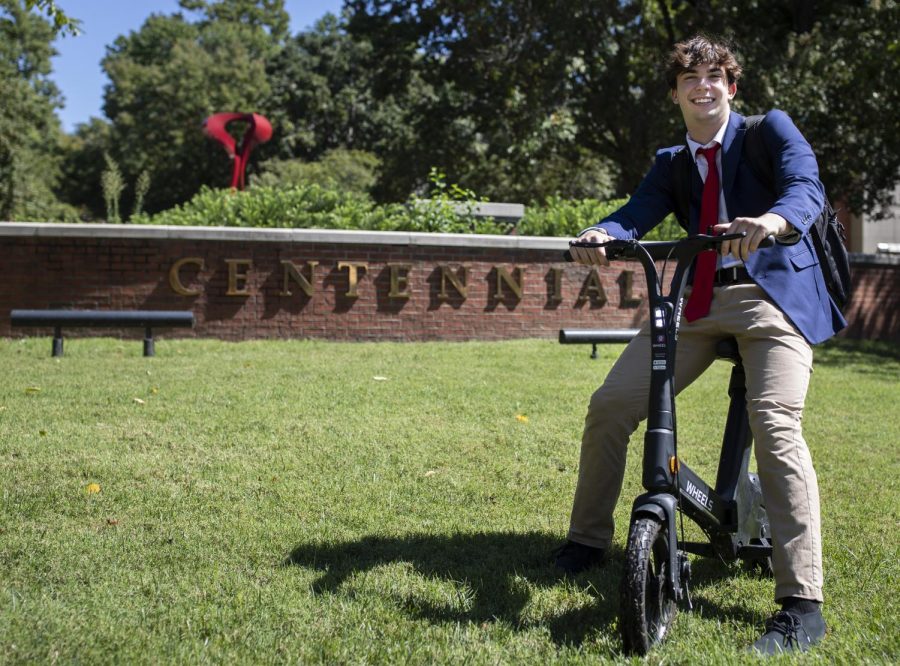‘Another element of mobility’: ‘Wheels’ electric scooters have arrived on campus
Tucker Covey / College Heights Herald
Jaxon Straub, a freshman in finance at WKU sits on a Wheels scooter during a Q&A at Centennial Mall on WKU Campus in Bowling Green, Ky. on Monday, Sept. 12, 2022.
September 14, 2022
WKU students have a new tool in their unending battle against gravity and the Hill — electric scooters.
Parking and Transportation has partnered with California-based rental company Wheels to bring scooters to the city of Bowling Green, offering rides for 29 cents a minute, according to the Wheels app.
Students must first download the app and input their credit card information in order to rent the bikes, Nathan Huber, Head of University at Wheels, said.
Each scooter is equipped with a scannable QR code that allows the rider to rent the bikes. Once the rider has finished, they park them in a designated “preferred parking zone” set up by the company. Huber said these are subject to change to fit the demand.
According to Huber, the app will then allow the users to take a picture of the parked scooter showing that it has been parked in the correct spot.
A “geofence” has been set up using GPS around areas of the city and campus to prevent scooters from being used in places where they are prohibited, like Avenue of Champions or Fountain Square Park.
The scooters also have rechargeable, swappable batteries that will be recharged in the local Wheels warehouse by members of the company.
“We charge [the batteries] in our own warehouse, so there’s not going to be any charging in a dorm room or campus apartments,” Huber said. “We see one starting to get low, then we get a ping on the back end and we can pop a new battery in there.”
Huber said the university will get 2.5% of the gross profits from the scooter rentals.
“It doesn’t cost anything to run this program, this program is completely free for the university,” Huber said. “As long as we prove our worth, the campus stands to make some money off this and we’re glad to give back.”
A battery charge lasts roughly 25-30 miles, Huber said, but it could vary depending on external factors like topography and weather.
Jennifer Tougas, assistant vice president for business services for WKU’s Division of Strategy, Operations and Finance, said as many as 300 scooters are expected to serve the city.
“About 25% of our students don’t bring a car to campus, and [the scooters] provide some affordable transportation for those students,” Tougas said. “Because of the partnership with the city, it also really creates an opportunity for students to go downtown and really make that downtown connection.”
Scooters can be driven between WKU’s campus and downtown, allowing students to use them for a quick coffee trip or a night on the town.
Huber said the conversations to get the scooters in the city and on campus started pre-pandemic and talks were put on hold by COVID-19 and the tornadoes that hit Bowling Green in December.
“This has been going on for a while,” Huber said.
Telia Butler, Bowling Green’s downtown development coordinator, said the city was approached after the initial agreement between Wheels and WKU to allow several parking hubs to be placed downtown.
“It provides another element of mobility that Bowling Green just didn’t have before,” Butler said. “Hopefully not only campus, but the entire community, embraces it and it becomes a staple in the way that mobility functions around downtown.”
Scooters are operational from 4 a.m. to 11:59 p.m., which Butler said aims to prevent drunk or reckless driving.
Tougas said as electric scooters become more prevalent, both through e-share services and student ownership, administration has discussed early plans for a new “micro-mobility personal transportation” policy to protect students riding or walking.
Tougas said the policy “is still in the formative stages,” but Tougas advised riders to wear helmets and follow traffic laws.
“When it comes to what students do, ultimately, how they ride those bikes is going to dictate their safety, and their safety is really in their hands to a great extent,” Tougas said.
City reporter Michael J. Collins can be reached at michael.collins527@topper.wku.edu. Administration reporter Michael Crimmins contributed to this report.















